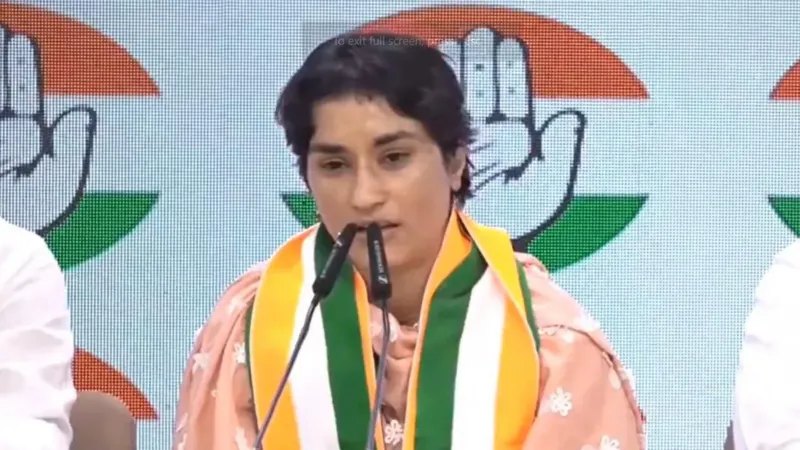India’s famous wrestler Vinesh Phogat has recently retired from the sport. This time she has entered politics. Phogat has recently entered politics due to joining the Congress party. She has entered politics after moving away from wrestling. She has earned a lot of name in the field of wrestling and has faced many challenges.
From wrestling fame to joining politics
Vinesh Phogat, who is known for her extraordinary wrestling career, is well known in India especially due to her performance on the international stage. Her career has been rewarded with many awards, including several medals at the World Wrestling Championships and the Commonwealth Games. However, her recent retirement from competitive wrestling came after an intense and emotional period. The defining moment of the end of her wrestling career was her disqualification from the Paris Olympics, where she missed the chance to participate in the final match due to weight irregularities.
Phogat’s decision to retire from wrestling was reacted to by her fans with both sadness and sympathy. The disqualification came as she failed to meet the weight limit for her last bout, which was a huge setback not just for her personal aspirations but also for India’s hopes of winning an Olympic gold in wrestling – a feat that had eluded the country.
A new chapter: Joining the Congress party
Days after announcing her retirement, Phogat has turned her focus to politics. In a statement made during a press conference organised by the Congress party, Phogat expressed gratitude for the opportunity to serve her country in a new capacity. Her foray into politics is being seen as a strategic move, coinciding with the upcoming assembly elections in her home state of Haryana.
Phogat’s entry into the Congress party is not an isolated event. Along with her, another renowned wrestler and Olympian Bajrang Punia has also joined the party. This double entry has sparked significant political discussion, especially given the wrestler’s prominent status and his involvement in recent high-profile controversies.
Wrestlers’ impact on Haryana elections
The timing of Phogat and Punia’s political debut is notable. Haryana, known for its strong agricultural base and significant wrestler population, is gearing up for the assembly elections. The inclusion of high-profile athletes like Phogat and Punia is expected to impact the electoral landscape. Political analysts suggest that their popularity, especially among local farmers and sports enthusiasts, could give the Congress party a substantial edge in the elections.
Phogat’s association with the farmers’ protest has also been a topic of discussion. She has previously shown support for farmers’ demands, including a guaranteed floor price and other crucial reforms. Her political involvement is likely to resonate with Haryana voters, where agricultural issues and support for local heroes are important.
Resignation from Indian Railways and role in protests
Before joining the Congress, Phogat resigned from her post as Officer on Special Duty (OSD) of the Indian Railways. The role, given as an honour to Olympians, was a key position that allowed Phogat to pursue her wrestling career as well as contribute to sports administration. Given that her resignation letter shared publicly cites “personal reasons” for her departure, the move seems to align with her moving towards a new career path.
Phogat’s recent political move also reflects her continued involvement in advocacy and public issues. Last year, she was a prominent figure in the protests against former Wrestling Federation of India (WFI) chief Brij Bhushan Singh. Singh, who has been accused of sexual harassment, became a controversial figure in the wrestling community. Phogat’s involvement in these protests, including dramatic encounters with law enforcement, drew widespread attention and demonstrated her commitment to addressing critical issues within the sport.
The Road Ahead: Challenges and Opportunities
As Phogat progresses on her political journey, she faces a unique set of challenges and opportunities. Going from a famous athlete to a political figure will require her to navigate the complexities of public service and political strategy. Her past experiences, including her advocacy work and personal struggles, will likely influence her approach to her new role.
Phogat’s commitment to serving the country and her focus on issues like women’s empowerment and agricultural reforms will be closely watched. Her ability to translate her success on the mat into effective political action will be a key factor in her effectiveness as a public servant.
